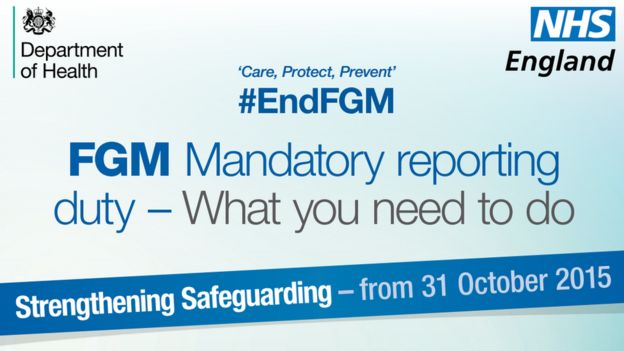Doctors, nurses, midwives and teachers are now legally required to report cases of female genital mutilation (FGM) to the police.
Failure to do so will result in disciplinary measures and could ultimately lead to them being barred from working.
The rules apply in England and Wales when girls under 18 say they have been cut or staff recognise the signs.
FGM has been illegal in the UK since 1985.
The practice, also known as female circumcision, refers to any procedure that alters or injures the female genital organs for non-medical reasons.
In its most severe form, the genitals are cut and stitched closed until the victim is ready to have a baby and then sewn back up again. Proponents believe this keeps women and girls "hygienic, chaste and faithful".
Studies are under way to work out how many are affected - but the figure is thought to be around 137,000 in England and Wales.
The government is committed to ending the "abusive and illegal practice" within a generation.
 NHS England
NHS England
The new rules say cases should be reported promptly - ideally by the end of the next working day after they are discovered.
Guidance has been drawn up by the NHS, the Department of Health and medical Royal Colleges to help staff understand the new rules.
Public Health Minister Jane Ellison said: "Healthcare professionals are at the forefront of the fight to end FGM and this new duty is the next step in that fight.
"The tools we are providing will empower NHS staff and support them in strengthening their safeguarding response for our girls who are at risk, and better protect and care for those living with FGM."
Hilary Garratt, the director of nursing at NHS England, said: "NHS England is committed to helping to eradicate FGM, while ensuring that women and children who have been victims receive the treatment and support they need.
"This new guidance will support health professionals to recognise FGM and ensure they report it."
Mandatory reporting is not currently a legal requirement in Scotland but some politicians have been pushing ministers to follow the UK government's lead. In March,First Minister Nicola Sturgeon announced £220,000 of funding for "community engagement projects, awareness-raising and training and support services".
In June the Northern Ireland Assembly introduced protection orders which prevent travel for young girls thought to be at risk of being taken abroad for FGM procedures.
Female genital mutilation
- Includes "the partial or total removal of the female external genitalia or other injury to the female genital organs for non-medical reasons"
- Practised in 29 countries in Africa and some countries in Asia and the Middle East
- An estimated three million girls and women worldwide are at risk each year
- About 125 million victims estimated to be living with the consequences
- It is commonly carried out on young girls, often between infancy and the age of 15
- Often motivated by beliefs about what is considered proper sexual behaviour, to prepare a girl or woman for adulthood and marriage and to ensure "pure femininity"
- Dangers include severe bleeding, problems urinating, infections, infertility and increased risk of newborn deaths in childbirth
- In December 2012, the UN General Assembly approved a resolution calling for all member states to ban the practice
No comments:
Post a Comment